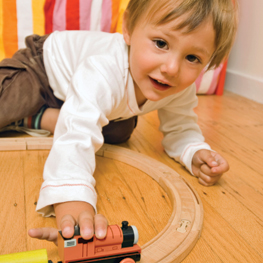
It may look like they're just playing, but pint-sized pupils are developing skills that will last a lifetime. Playing dress up, finger painting, pushing trains around a track - preschool certainly looks like a lot of fun, but you may be wondering, Will my child really learn anything? And in today’s tough economic climate, is it worth the expense? Most definitely, say early-childhood experts, who insist that play is the ideal way for three and four year olds to develop essential academic and social skills. Here are some of the important lessons young children will absorb under the guise of play.
How to Behave at School
The typical preschool classroom can seem pretty chaotic to a casual observer, given all the different play centres and activities going on. Appearances to the contrary, there are still plenty of rules and routines in place that teach children how to conduct themselves in a school setting and be part of a group. “Preschoolers learn how to postpone acting on their first impulse, which is so essential,” says Lilian G. Katz, Ph.D., Professor Emerita and co-director of the Clearinghouse on Early Education and Parenting (CEEP). They begin to understand the concept of taking turns and pretty soon, everyday tasks like lining up to go outside and sitting in circle for storytime become second nature.
How to Ask for Help
By the age of three or four, most children are adept at asking mom or dad to pour them a glass of milk or help them reach a toy on a high shelf. But what happens at school when a shoe becomes untied or they don't quite make it to the bathroom? “In preschool, children have the opportunity to acquire and polish the social skills they'll need to interact successfully with adults, particularly adults they don't know,” says Dr. Katz. Sure, they'll probably have to elbow past other kids all clamoring for the teacher's attention, but that will teach them to assert themselves. Research shows that a positive experience with a first teacher helps children gain confidence and form productive relationships with future teachers and adults.
How to Investigate and Explore
Endless opportunity exists during playtime for preschoolers to learn about the world around them. “The optimum environment is both fun and educational, and the astute teacher sets out to create just that,” says Stella Leonard, director of the Palm Desert Community Presbyterian Church Preschool and Kindergarten. “It's what play-based learning is all about. Measuring cups should always be within reach in the sandbox - that's an elementary math lesson right there. And introduction to science happens when children are encouraged to follow the flight path of a butterfly who happens upon the playground or to study a ladybug up close.” The setting may seem relatively unstructured but studies show that children learn best when teachers order the environment to provide kids with interesting materials and new ideas to explore. The added benefit is that nurturing a child's natural curiosity will foster a lifetime love affair with learning.
How to Make Friends
You're probably in the habit of setting up playdates for your youngster, but preschool gives your child the chance to forge friendships on their own and settle differences without the help of a parent or caregiver. “Preschoolers learn how to approach other children and be comfortable around them,” says Dr. Katz. As time passes, they'll figure out how to start up a conversation by focusing on the other person so that initial interactions become less a case of one-upmanship. Asking “What are you doing?” will win them more friends than the conversation starter “I can dig a deeper hole than that” ever will, but children only gain this social savvy through trial and error amongst their peers. Setting the stage for social competence at a young age benefits kids as they get older and they need to work on school projects in pairs or in groups.
How to be Independent
In the interest of time management, many parents tend to automatically help their three or four year olds with the small tasks of everyday life, such as fastening buttons and zippers or opening a packaged snack. But preschool teachers, who may need to get 12 or more kids quickly into their coats and out onto the playground, encourage students to take more responsibility. “Children learn how to put on their own jackets, open their own juice boxes and remember to wash their hands after going to the bathroom,” says Leonard. Early practice in self-care skills will boost your child's confidence in other settings such as a visit to a friend's house where you're not around to intercede. It will make your life easier, too!
June is a freelance writer and the mother of two children.
Calgary’s Child Magazine © 2024 Calgary’s Child